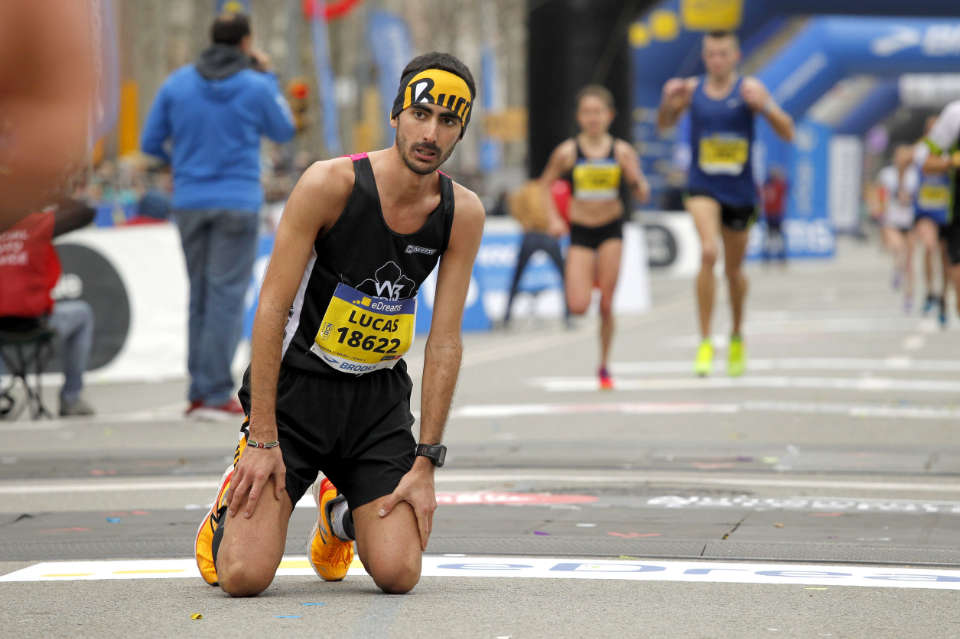It’s every runner’s worst nightmare: You train like crazy, watch your diet and show up at the start line extra-early to get the lay of the land. Even the weather is idyllic. But with your confidence at an all-time high, something happens before or during your race that makes it unlikely you’ll finish for any number of reasons.
What do you do? Keep going and put yourself in harm’s way? Stop and breathe? Give up? This is no easy decision, which is why thinking about this possibility before it occurs could give you the wisdom you need to make a faster decision should such circumstances impact you in the future.
What can go wrong?
At the most extreme, you could encounter the running dead, coming in your direction as a wave in a full-blown zombie apocalypse!

In less daunting circumstances, the following are scenarios that might give you pause, though you can probably come up with others that are equally formidable:
- You are beset with horrible stomach or leg cramps — so severe you must stop, sit or even lie down.
- Heat may overwhelm you — especially if it’s humid and you’re not properly hydrated.
- An unexpected downpour accompanied by lightning bolts rain down from the sky.
- A Boston-marathon scenario happens in which evil people seek to do harm to spectators and runners.
- You are stricken with a gastrointestinal malady that leaves you incapable of controlling your bowels.
- A collision with another runner or a fall leaves you badly injured.
- You’re simply too exhausted to go a foot further on the route despite your “never quit” philosophy.
What can you do before you run to ensure your well-being?
From the moment you register for a marathon, it’s important to re-evaluate your fitness routine so your body and mind are prepared for all possibilities.

While you can’t intuit every scenario you may encounter, taking these preparations may eliminate certain catastrophes before they strike:
- Drink proper amounts of water before and during your race.
- Follow a recommended diet to get your GI system aligned for the challenge you face on race day.
- Get an adequate amount of sleep on the night before your run so you’re well rested.
- Wrap or treat vulnerable areas of the body with elastic bandages or other parts to protect them from harm.
- If you suspect you haven’t trained properly — even on race day — you could sustain an injury, so why risk it?
- Address your anxiety. If fears of failure overcome positive self-talk, perhaps you should withdraw from the race.
Case studies of runners who found themselves unable to finish their events
Camille often says that life is what happens when making other plans, so when she signed up for a Singapore marathon down the road, she followed a disciplined plan. After investing entry fees, training time and her ego in a respectable finish, she awoke on the big day feeling sick as a dog. Faced with DNS (did not start) and DNF (did not finish) outcomes, she bowed out, promising to come back stronger next time around.
Ethan’s stamina and capacity for pain were legendary among the members of his running club, but half-way through a marathon that seemed likely to deliver a new personal best, he injured himself badly enough to cause an EMT on scene to advise him to quit.
He remembered his girlfriend’s words as he sat having his leg attended to: “There’s always another race if things don’t work out for you.” He took her advice and looked forward to the TLC only she could provide!

Susie was as close to her next PB as she had ever been when the heavens opened up, spectators scattered for cover and contestants abandoned the route in favour of the safety measures event organisers had announced before the race was flagged off. Susie stood there perplexed and confused as lightning bolts lit up the sky.
Did it make sense to put her life on the line for a finisher’s medal? The sensible answer was, “No way!” Discouraged yet satisfied with her decision, she ran for cover, hoping he race would re-start, despite kissing that PB goodbye.
You can quit, save face and show the world your courage
Throughout your life you may have gotten the impression that quitting was only for losers, but nothing could be further from the truth. In fact, how and why you quit actually shows your true character.

There’s nothing selfish about self-preservation. In fact, putting oneself in harm’s way can be a symptom of low self-esteem (your ego depends upon finishing no matter what), self-hatred (my life means so little why not risk all rather than quit?) and other self-destructive behaviours. A true winner confronts quitting with grace, knowing there are other goals to accomplish, thus the following advice can empower you:
- The moment you decide to quit, choose your next race and commit to finishing it.
- There’s no disgrace in either a DNS or DNF. Life happens.
- If you know that you won’t meet the race finish time window, why not keep going?
- Ask yourself whether you wanted that finish for yourself or for someone else. Pleasing someone else is no reason to enter a marathon in the first place.
- Adopt the legendary Arianna Huffington’s philosophy: Quitting can be the best way to finish something. Winners “know when to quit,” she said, which makes them savvy, secure, mature people with the healthiest of outlooks.
Have you ever confronted a situation that caused you to stop and question the wisdom of starting or continuing to run a marathon? What did you decide?





